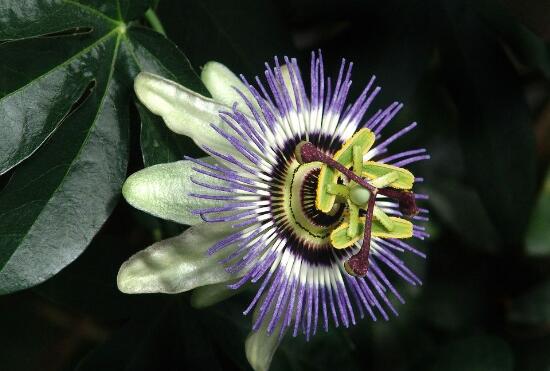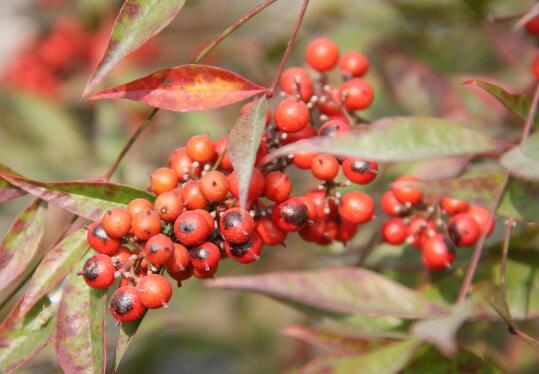How to propagate passionflower? three propagation methods / cutting survival rate of passionflower is 85%.
Passionflower, we should be no stranger, it is also called passion fruit, is a very powerful plant. Nowadays, passionflower is widely cultivated all over the world, not only because of its strange flower shape, but also because of its rich nutritional value and edible taste, so how does passionflower breed? Here are three breeding methods of passionflower, follow the editor to learn about it.
How to propagate passionflower, cuttage / sowing / striping

Because of the efficacy of passionflower, many people keep it at home. Compared with beginners buying existing potted plants directly, veterans will reproduce on their own. As for how to reproduce passionflower, generally speaking, there are three methods: cutting, sowing and striping, of which the most convenient and simplest is cutting, which will be introduced in detail by the editor below.
2. Three breeding methods of passionflower
(1) Passiflora edulis cutting technique
1. Passionflower cutting season
The cuttage propagation of passionflower can be carried out all year round if it is indoors in the north. However, the best cutting season is autumn, the specific time is from July to August, this is the rapid growth period of passionflower, strong activity.
2. Cuttings selection
In passionflower cutting technology, the most important thing is good cuttage, it is selected, the whole cutting success rate will be very high. Passionflower cuttings should select mature, full branches as cuttings, each cuttings with two or three nodes is the best, the lower incision is 1 cm away from the internodes, and the upper incision should be 2 cm above the terminal bud, so that it is easiest to root.
Cuttings treatment: after passionflower cuttings are selected, root treatment should be carried out and the lower part of the cuttings can be soaked in indolebutyric acid solution ranging from 3000 to 10,000 times for 30 seconds to 2 minutes. In addition, the cuttings retain half to one leaf and cut off all the tendrils, which helps to save nutrients.
3. Cutting substrate
According to the growth habits of passionflower, the cutting substrate of passionflower can be mixed with loose and fertile garden soil or paddy field.
4. Cuttings start
Get ready for the above, passionflower cuttage can officially begin. Insert the cuttings into the prepared substrate, the insertion depth should be 2 beat 3 of the length of the cuttings, leaving the upper part of the bud to germinate and grow branches. After insertion, put the nutrition bag on the seedling bed and water it immediately. The first watering must be thoroughly watered, and then the watering should be kept moist according to the weather conditions.
5. Plug-in management
After 30 days of passionflower cutting, the seedling rate can reach more than 85%! After cutting to maintain the humidity of the seedling bed, use plastic film small arch shed or greenhouse to raise seedlings, at the same time to drench every day to maintain humidity. In winter and early spring, we should pay attention to the cold prevention of the seedbed, using plastic film small arch shed or greenhouse to raise seedlings to prevent cold, in addition to the need to open in sunny days, the rest of the time should be covered with plastic film.
(2) sowing and propagation of passionflower
Passionflower blossoms and bears fruit, there are seeds left naturally, so passionflower can be propagated by sowing, and it is appropriate to sow seeds in spring and autumn. Specific operation: spread passionflower seeds evenly on the seedbed, cover with a thin layer of grass and drench with enough water. After sowing, it should be watered according to weather conditions, spray water once every morning and evening on a sunny day, and begin to be unearthed about half a month later.
(3) striping propagation of passionflower.
In addition to cutting and sowing, passionflower can also be propagated by pressing, and the appropriate time is 2-3 months. Specific operation: press the strong and well-growing branches on the mother plant into the soil to form adventitious roots, and then separate the branches above the adventitious roots from the mother plant to form an independent new plant. This method is a little bit for beginners, you can have a brief understanding of it.
Generally speaking, the propagation of passionflower can survive no matter by cutting, sowing, or pressing, but what is most suitable for the majority of flower friends is sowing and cutting, and those who are interested can all learn. With regard to the breeding methods of passionflower, the editor has introduced this, hoping to give you some help.
How to propagate, cut, sow and split passionflower
If you are ready to breed passionflower, you can see that passionflower can be propagated by cutting, ramet and seed sowing. The following introduces the methods and steps of cutting, ramet, sowing and propagation of passionflower respectively.
How to propagate passionflower 1. Cutting propagation method
The method of cutting propagation is the main propagation method of passionflower, and the cutting time can be carried out in early spring every year, or in summer and autumn. Generally, the survival rate of cutting in greenhouse or hotbed from March to April is the highest, and the soil for cutting is sandy loam with a small amount. Rotten leaf soil or peat is suitable.
The cuttings were taken from the tuberous roots which had been accelerated, and the cuttings could be peeled off from the base when a pair of leaves at the base of the new buds were unfolded. You can also leave more than one section at the base of the new buds, and then take the buds at the axillary buds with the growth, so that more cuttings can be obtained.
The spring seedlings grow fully in summer and autumn and can blossom in the same year. Buds can be taken from growing plants for summer cutting from June to early August, but the survival rate is lower than that in spring. The survival rate of cuttings from September to October is lower than that in spring, but higher than that in summer.
2. The method of ramet propagation
Fen root propagation is also a common propagation method of passionflower, because passionflower can only germinate at the root neck, and it must have part of the root neck when it is divided, otherwise it can not sprout new plants. In order to facilitate identification, the method of burying roots in advance is often used to accelerate sprouting.
Wait until the adventitious buds on the root neck of passionflower germinate before they are split and planted. The root-splitting method is simple and easy, the survival rate is high, the seedlings are strong, but the number of propagation plants is limited.
3. Methods of seed propagation.
The seed sowing method is limited to flower bed varieties and breeding. Generally, passionflower seeds are mostly collected from those who mature after autumn, because vertical petal varieties are not easy to obtain seeds, so artificial pollination is necessary. The sowing is generally carried out in the sowing box, about 20 C, sprouting and unearthing in 4-5 days, replanting after the true leaves grow, and flowering after 1-2 years.
How does passionflower breed? Breeding methods of planting passionflower
Passionflower has both edible, ornamental and medicinal value. it is not only a fragrant and delicious fruit, but also a famous herbal medicine, and it is also an ideal garden ornamental plant with high planting value. However, the propagation methods of sowing, striping and cutting are often used in the planting process of passionflower. So, how do passionflower breed? The following is to introduce the breeding methods of planting passionflower. Let's take a look.
Picture: passionflower
First, sowing and reproduction
Seed propagation can be carried out all the year round, but it is better to sow in spring and autumn. Generally, the plants with strong growth, no diseases and insect pests, high and stable yield are selected as the mother plant, the fruit with correct shape, heavier and fully ripe fruit is picked, the seeds are taken out, the residue is washed and dried, and then sown. Sow 1 kg of seeds with 10-20 grams of carbendazim for about 20 minutes, then spread the seeds evenly on the seedbed, cover with a thin layer of grass, drench in enough water, and transplant when the seedlings grow 4 true leaves.
Picture: passionflower
2. Striping propagation
Striping propagation is a kind of asexual reproduction, which is suitable for February-March in spring, which is to press the branches of the mother plant into the soil or wrap them with soil to form adventitious roots, and then separate the branches above the adventitious roots from the mother plant to form an independent new plant. During striping, circular peeling can be carried out in order to interrupt the downward transport of organic matter such as sugar, auxin and other substances from the upper end of leaves and branches, so that these substances accumulate in the upper part of the treatment and can be used for rooting. This method has the advantages of simple, fast growth and short seedling growth time.
Picture: passionflower
3. Cutting propagation
The method of cuttage propagation was adopted. The cutting time is from February to March in spring, and it can also be cut in autumn. A robust and mature annual branch vine was selected as cutting material, and the cuttings were cut into 2-3 nodes, about 10 cm-15 cm in length, 1 cm below the node and 3 cm away from the node at the lower end and 3 cm away from the node with 1 whole leaf. After cutting, soak the cuttings with Abr rooting powder 25 mg / kg aqueous solution for 30 minutes, and then cultivate the cuttings in a nutrition bag with a diameter of 8 cm × 12 cm. The nutrient soil is 50% fine loess and 50% humus soil, and the cutting depth is up to 2x3 of the cutting length. After cutting, the nutrition bag is placed on the seedling bed and watered immediately. The first watering must be thoroughly watered and then watered according to the weather conditions. The nursery bed is 1.0 m-1.2 m wide and the length varies with the topography. A bow-shaped bracket is made of bamboo and covered with a shade net with a shade of 50%. After 30 days, the seedling rate can reach more than 85%. It takes about 3-4 months for cuttings to come out of the nursery.
[editor's conclusion] doing a good job in the reproduction of passionflower is the basis for the survival of passionflower planting. The breeding method of planting passionflower is introduced to you above. Have you all learned it?
- Prev

How to reproduce, the breeding method / time is in the warm season.
Rabdosia angustifolia is a plant that can be cultivated for many years, and its growth rate is relatively fast, so when it grows to 2-3 years, it can reproduce. On the question of reproduction, its operation is relatively simple, so how to reproduce? The editor introduces three common propagation methods of Rabdosia angustifolia.
- Next

What about the growing insects of Phyllostachys pubescens? pest control of Phyllostachys pubescens / 2 pests 2 diseases
In the process of cultivating Phyllostachys pubescens, the last thing we want to encounter is the problem of diseases and insect pests, which do great harm to the plant, and it is easy to make the plant die if we don't deal with it in time. So what about the bamboo worm in Nantian? How to control the diseases and insect pests of Phyllostachys pubescens? First, what to do with the growing insects of Phyllostachys pubescens
Related
- Fuxing push coffee new agricultural production and marketing class: lack of small-scale processing plants
- Jujube rice field leisure farm deep ploughing Yilan for five years to create a space for organic food and play
- Nongyu Farm-A trial of organic papaya for brave women with advanced technology
- Four points for attention in the prevention and control of diseases and insect pests of edible fungi
- How to add nutrient solution to Edible Fungi
- Is there any good way to control edible fungus mites?
- Open Inoculation Technology of Edible Fungi
- Is there any clever way to use fertilizer for edible fungus in winter?
- What agents are used to kill the pathogens of edible fungi in the mushroom shed?
- Rapid drying of Edible Fungi

